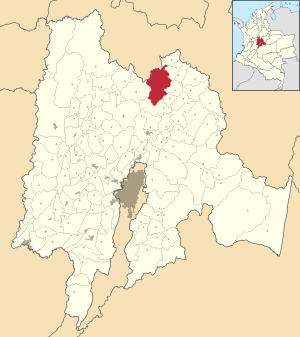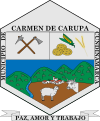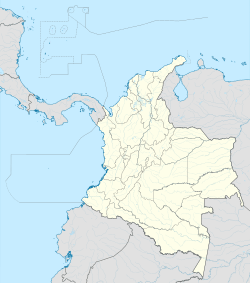Carmen de Carupa facts for kids
Quick facts for kids
Carmen de Carupa
|
|||
|---|---|---|---|
|
Municipality and town
|
|||
|
|||
 |
|||
| Country | |||
| Departamento | |||
| Province | Ubaté Province | ||
| Founded | 20 July 1808 | ||
| Founded by | José Joaquín Urdaneta and Doña Ventura | ||
| Area | |||
| • Municipality and town | 228 km2 (88 sq mi) | ||
| • Urban | 0.45 km2 (0.17 sq mi) | ||
| Elevation | 2,600 m (8,500 ft) | ||
| Population
(2015)
|
|||
| • Municipality and town | 9,109 | ||
| • Density | 39.95/km2 (103.47/sq mi) | ||
| • Urban | 2,374 | ||
| Time zone | UTC-5 (COT) | ||
| • Summer (DST) | UTC-5 (COT) | ||
| Website | Official website: http://www.carmendecarupa-cundinamarca.gov.co/ | ||
Carmen de Carupa is a small town and municipality in Colombia. It is located in the department of Cundinamarca, within the Ubaté Province. This area is part of a larger flat region called the Altiplano Cundiboyacense.
Carmen de Carupa is surrounded by other towns. To the west, it borders San Cayetano. To the south, you'll find Tausa and Sutatausa. To the east are Ubaté and Susa. Finally, to the north, it shares borders with Simijaca, Buenavista, and Coper in the Boyacá department.
Contents
History of Carmen de Carupa
Who lived here before?
Before the Spanish arrived, the land around Carmen de Carupa was home to the Muisca. They were an important group of people who lived in the central highlands of Colombia. A local leader, called a cacique, from the nearby town of Ubaté, was in charge of the Carmen de Carupa area. To the west and north of Carmen de Carupa lived another group of people called the Muzo.
When was Carmen de Carupa founded?
The modern town of Carmen de Carupa was officially started on July 20, 1808. It was founded by two people named José Joaquín Urdaneta and Doña Ventura.
Economy of Carmen de Carupa
What do people do for work?
The main way people make a living in Carmen de Carupa is through agriculture. This means farming. The most important crop grown here is potatoes. Farmers work hard to grow potatoes, which are a big part of the local economy.
See also
- In Spanish: Carmen de Carupa para niños
 | Selma Burke |
 | Pauline Powell Burns |
 | Frederick J. Brown |
 | Robert Blackburn |




